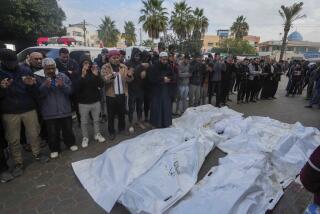Iraq Reportedly May Free Ill, Elderly Americans : Concessions: The Saudis hint of willingness to consider Hussein’s claims against Kuwait--but only after a pullout.
DHAHRAN, Saudi Arabia — In an apparent new concession on hostages, Iraqi President Saddam Hussein agreed in a private session over the weekend to release some sick and elderly Americans still being held as “guests” of Iraq, participants in the meeting said Monday.
The promise was announced by the leader of the American-Iraqi Foundation after the meeting with Hussein in Baghdad. “We don’t want to talk about figures or names at the moment, but I’m happy to announce that some good news will come up,” said the foundation chief, Salim Mansour.
In another development, Saudi Arabia hinted that the Arab world might be prepared to consider Iraq’s territorial claims against Kuwait, but only after a full and unconditional withdrawal of Iraqi troops.
Saudi officials stressed that the kingdom had not softened its policy toward Iraq. But in a meeting with Arab reporters over the weekend, the Saudi defense minister had appeared to signal that his nation might sanction some Iraqi claims in any future negotiations after a troop pullout.
The announcement regarding the possible release of some Americans came amid a flurry of indications that Iraq may be softening its position on the thousands of foreigners still held against their will in Iraq and Kuwait. Among other things, Hussein asked his Parliament, which is virtually a rubber-stamp body, to consider letting all French hostages leave.
The request, in a letter to the legislators, said that such a move would be a sign of Iraq’s friendship with France, according to the official Iraqi News Agency. French leaders have won Iraqi favor by advocating that a resolution of the crisis caused by Iraq be linked to negotiations of the Israeli-Palestinian dispute.
Separately, Edward Heath, the former British prime minister who visited the Iraqi leader over the weekend, said Hussein had promised to release some sick and elderly Britons today.
There was no immediate confirmation from Iraq that Americans were to be freed. But Western diplomats expressed some optimism about the news and said they understood that as many as 57 sick and elderly Americans could be affected, the Associated Press reported from Baghdad.
In Washington, State Department spokeswoman Margaret Tutwiler said, “Until there is an actual release, we want to refrain from discussing what may or may not happen with this group and the Iraqi government.” She said the American-Iraqi group has been keeping in touch with the State Department and the U.S. Embassy in Baghdad.
The release of any of the Americans would mark a significant relaxation of Iraqi restrictions, which have prevented most American males from leaving. Earlier, Hussein allowed most American women and children and men of Arab descent to leave.
While some men have managed to escape overland to Jordan and Saudi Arabia, an estimated 700 to 800 Americans are still believed held against their will in Iraq and Kuwait. More than 100 have been rounded up and are thought to be held as human shields at industrial and military installations to deter a military attack against Iraq.
Diplomats in Baghdad on Monday released a handwritten letter from Americans and other Westerners complaining about their forced captivity at the strategic sites.
The hostages, whose number and names were not made available, described being forced to move inside a gas storage plant where it would be “impossible . . . to survive” any explosion. They accused the Iraqi leader of reneging on a commitment that foreign “guests” would share the same risks as Iraqi citizens.
The letter, a photocopy of which was distributed to reporters in Baghdad, described their camp in a liquefied petroleum gas terminal as “extremely dangerous” and vulnerable to fire or explosion “resulting from any reason whatsoever.”
In Saudi Arabia, the defense minister, Prince Sultan ibn Abdulaziz, seemed to open the door for eventual consideration of Iraq’s territorial claims, saying that his country “sees no harm in any Arab country giving to a sister Arab country land or site or position on the sea.”
“The kingdom of Saudi Arabia is in favor of giving rights to rightful people and calls for Arab national security, including concessions toward fraternal Arab brothers in favor of confirmed rights or doubtful rights,” the defense minister said in remarks Sunday to Arab reporters in Riyadh.
Amid speculation that the remarks signaled a new willingness to seek a compromise solution to the crisis, Saudi officials hastened Monday to emphasize that their demands remain unchanged.
The officials said they will continue to oppose any negotiated settlement that did not include an immediate Iraqi withdrawal and restoration of Kuwait’s government as basis points.
In Washington, White House spokesman Marlin Fitzwater said he spoke Monday morning with Prince Bandar ibn Sultan, the Saudi ambassador to the United States, and was assured that there has been “no change” in the Saudi position.
More to Read
Sign up for Essential California
The most important California stories and recommendations in your inbox every morning.
You may occasionally receive promotional content from the Los Angeles Times.









